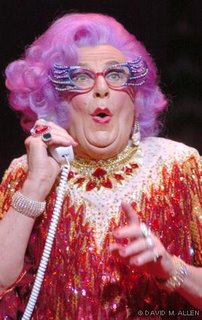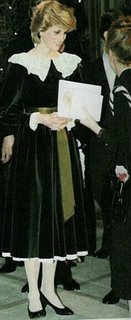When sex goes bad
It's that time of year when thoughts start turning to book awards -- The Edgar, the Booker, the Thriller, Newberry, Nobel, Hugo et al. But I can't believe I missed my favorite -- the Literary Review's annual Bad Sex Award.
As a recovering romance writer, I know how tough it is to write good sex scenes. In fact, we have on-camera sex for the first time in our crime writing careers in our upcoming book A THOUSAND BONES. And folks, let me tell ya, writing this stuff isn't for the squeamish. We've all seen our share of bad sex in crime fiction.
But apparently, literary writers make a worse mess of it than your average genre midlister. This year's winner was debut novelist Iain Hollingshead, a mere whippersnapper at age 25, for his book "Twenty Something."
a mere whippersnapper at age 25, for his book "Twenty Something."
Said the judges: "Because Hollingshead is a first-time writer, we wished to discourage him from further attempts. Heavyweights like Thomas Pynchon and Will Self are beyond help at this point."
So, here for your amusement, are excerpts from the Literary Review finalists. WARNING: Don't read these with a full mouth of beer without first covering your keyboards.

Black Swan Green by David Mitchell
If Dawn Madden's breasts were a pair of Danishes, Debby Crombie's got two Space Hoppers. Each armed with a gribbly nipple. Tom Yew kissed them in turn and his saliva glistened in the April sun. I know watching was wrong but I couldn't not. Tom Yew slipped off her red panties and stroked the cressy hair there.
"If you want me to stop, Madam Crombie, you have to say now."
"Oooh, Master Yew," she croodled, "don't you dare."
Tom Yew got on her and sort of jiggled there and she gasped like he was giving her a Chinese burn and wrapped her legs round him, froggily. Now he moved up and down, Man-from Atlantisly. His silver chain jiggled on his neck.
Now her grubby soles met like they were praying.
Now his skin was glazed in roast pork sweat.
Now she made a noise like a tortured Moomintroll.
Now Tom Yew's body jerkjerked judderily jackknifed and a noise like a ripping cable tore out of him. Once more, like he'd been booted in the balls.
Her fingernails'd sunk salmony welts into his arse.
Debby Crombie's mouth made a perfect O.
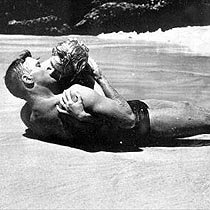
A Spot of Bother by Mark Haddon
She put her hand around his penis and moved it back and forth and it no longer seemed strange, not even a part of his body, more a part of hers, the sensations flowing in one unbroken circle. And she could hear herself panting now, like a dog, but she didn't care ...
And she realised that it was going to happen and she heard herself saying, 'Yes, yes, yes,' and even hearing the sound of her own voice didn't break the spell. And it swept over her like surf sweeping over sand then falling back and sweeping up over the sand again and falling back.
Images went off in her head like little fireworks. The smell of coconut. Brass firedogs. The starched bolster in her parents' bed. A hot cone of grass-clippings. She was breaking up into a thousand tiny pieces, like snow, or bonfire sparks, tumbling high in the air, then starting to fall, so slowly it hardly seemed like falling at all ...
He waited for a couple of minutes. "And now," he said, "I think it's my turn."

The Whole World Over by Julia Glass
You're a sexy lady, know that?" Stan whispered as he unzipped her pants.
She had no answer; she kept her eyes closed and sank into the music. His naked penis, when she felt it against her bare skin, was a shock, mostly for the desire it beckoned from Saga's marrow.
"So touch me, Story Girl," he said.
Still she said nothing and kept her eyes closed. She felt Stan's pubic hair, like a prickly sea creature, move in circles on her thigh. Then, another shock, she felt his fingers ...
When he raised himself slightly away from her again, she opened her eyes only long enough to see that he was taking a condom out of a drawer in the table that held the books and the phone. She closed her eyes again and let herself sink further down, or come more fully to the surface, she wasn't sure which ...
And then before her inner eye, a tide of words leaped high and free, a chaotic joy like frothing rapids: truncate, adjudicate, fornicate, frivolous, rivulet, violet, oriole, orifice, conifer, aquifer, allegiance, alacrity ... all the words this time not a crowding but a heavenly chain, an ostrich fan, a vision as much as an orgasm, a release of something deep in the core of her altered brain, words she thought she'd lost for good. It nearly deafened her (but not quite) to the other, more alarming wave - the groaning and happy cursing that came from Stan.

Bedroom Secrets of the Master Chefs by Irvine Welsh
As Skinner undressed, the old woman removed her coat and began to struggle out of a series of cardigans, pinafores and vests. Lying on the bed, she looked smaller but still monstrous, wrinkled rolls of flab spilling over the mattress. Foul aromas rose from the putrefying pools of sweat and dead skin trapped within the folds of her flesh. - Thoat ye'd be bigger, Mary pouted as Skinner removed his Calvin Klein briefs.
Fuckin cheeky auld clart ...
"Next time ah'll bring a strap on," he said bitterly.
Ignoring him, Mary lay back on the bed and pulled away at the sagging corrugations of her body until she was able to locate her sex. "Ah've nae cream tae lubricate this. Ye'll huv tae use spit. Howk it up," she commanded...
"Work it in," Mary urged, as Skinner took his thick green slime and spread it like a chef might glaze some pastry, at the same time slowly breaching and exploring. A ludicrously distended clitoris popped out from nowhere like a jack-in-the-box, the size of a small boy's penis, and disconcertingly strangulated groans coming from the bed told Skinner that he was hitting the spot. After a while she gasped, "Pit it in now ... pit it in ..."
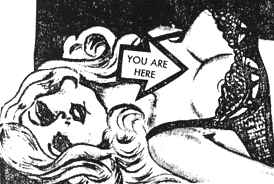 The Religion by Tim Willocks
The Religion by Tim Willocks
He slid his hands on to her breasts, moisture lingering in the creases beneath them, and his memory of their magnificence was shamed by the beauty they embodied now. Love and desire became one, each as overmastering as the other, and he pulled the red surcoat over her head and sucked her nipples and stroked her swollen vulva until she trembled and clung on to him and mewled with pleasure in his ear. He turned her about, her eyes bedazed and rolling with transport, and he bent her across the cold steel face of the anvil. He unfastened his flies and unlimbered himself and she rose up on tiptoe to receive him. He bent his knees to get beneath her and entered her from behind and her feet left the floor and she called out to God and convulsed with each slow stroke, her head thrown back and her eyelids aflutter, and her cries filled the forge until she squeezed him from inside and he exploded to a prayer of his own within her body. They fell to the surcoat on the ground and Tannhauser held her in his arms and he stroked her hair while her body was racked by sobs.
 The Book of Dave by Will Self
The Book of Dave by Will Self
Dave licked between Phyllis's shoulder blades and drove his tongue down her grooved back. She shuddered and, grabbing his thigh, pulled it up and over her own so that he half straddled her. In the confusion of their bodies - his hairy shanks, her sweaty thighs, his bow-taut cock, her engorged basketry of cowl and lip - there was clear intent; so that when he penetrated her, they moved into and out of one another with fluid ease, revving and squealing, before arriving quite suddenly.
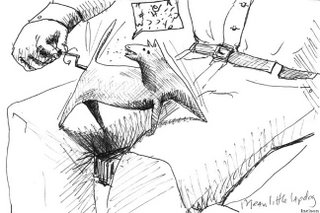 Against the Day by Thomas Pynchon
Against the Day by Thomas Pynchon
"Mouffette? She's a papillon...a sort of French ladies' lapdog."
"A - You say," gears in his mind beginning to crank, " 'lap' - French...lap-dog?"
Somehow gathering that Ruperta had trained her toy spaniel to provide intimate "French" caresses of the tongue for the pleasure of its mistress.
"Well! you two are...pretty close then, I guess?"
"I wuv my ickle woofwoof, ess I doo!"
His thoughts taking wing. The day alone with a French "lap" dog! who might be more than happy to do for Reef what she was obviously already doing for old 'Pert here! who in fact, m-maybe all this time's been just droolin' for one-them penises for a change, and will turn out to know plenty of tricks! A-and- ...
It took a while for Ruperta to get her toilette perfect and her bustle out the door. Reef found himself pacing and smoking, and whenever he took a look over at Mouffette could've sworn she was fidgeting too. The dog, it seemed to Reef, was giving him sidewise looks which if they'd come from a woman you would have had to call flirtatious. Finally after an extended farewell notable for its amount of saliva exchange, Mouffette slowly padded over to the divan where Reef was sitting and jumped up to sit next to him. Jumping on the furniture was something Ruperta seldom allowed her to do, and her gaze as Reef clearly assumed that he would not get upset. Far from it, what he actually got was an erection. Mouffette looked it over, looked away, looked back, and suddenly jumped up on his lap.
"Oboy, oboy." He stroked the diminutive spaniel for a while until, with no warning, she jumped off the couch and slowly went into the bedroom, looking back now and then over her shoulder. Reef followed, taking out his penis, breathing heavily through his mouth. "Here, Mouffie, nice big dog bone for you right here, lookit this, yeah, seen many of these lately? come on, smells good don't it, mmm, yum!" and so forth, Mouffette meantime angling her head, edging closer, sniffing with curiosity. "That's right, now, o-o-open up... good girl, good Mouffette now let's just put this - yaahhgghh!"
Reader, she bit him.
And the winner is...

Twentysomething by Iain Hollingshead
She's wearing a short, floaty skirt that's more suited to July than February. She leans forward to peck me on the cheek, which feels weird, as she's never kissed me on the cheek before. We'd kissed properly the first time we met. And that was over three years ago.
But the peck on the cheek turns into a quick peck on the lips. She hugs me tight. I can feel her breasts against her chest. I cup my hands round her face and start to kiss her properly, She slides one of her slender legs in between mine. Oh Jack, she was moaning now, her curves pushed up against me, her crotch taut against my bulging trousers, her hands gripping fistfuls of my hair. She reaches for my belt. I groan too, in expectation. And then I'm inside her, and everything is pure white as we're lost in a commotion of grunts and squeaks, flashing unconnected images and explosions of a million little particles.
Now if you'll excuse me, I am going to go have a cigarette. I'll just crush the lit butt into my forehead. It would be, I am sure, less painful than this.
As a recovering romance writer, I know how tough it is to write good sex scenes. In fact, we have on-camera sex for the first time in our crime writing careers in our upcoming book A THOUSAND BONES. And folks, let me tell ya, writing this stuff isn't for the squeamish. We've all seen our share of bad sex in crime fiction.
But apparently, literary writers make a worse mess of it than your average genre midlister. This year's winner was debut novelist Iain Hollingshead,
 a mere whippersnapper at age 25, for his book "Twenty Something."
a mere whippersnapper at age 25, for his book "Twenty Something."Said the judges: "Because Hollingshead is a first-time writer, we wished to discourage him from further attempts. Heavyweights like Thomas Pynchon and Will Self are beyond help at this point."
So, here for your amusement, are excerpts from the Literary Review finalists. WARNING: Don't read these with a full mouth of beer without first covering your keyboards.

Black Swan Green by David Mitchell
If Dawn Madden's breasts were a pair of Danishes, Debby Crombie's got two Space Hoppers. Each armed with a gribbly nipple. Tom Yew kissed them in turn and his saliva glistened in the April sun. I know watching was wrong but I couldn't not. Tom Yew slipped off her red panties and stroked the cressy hair there.
"If you want me to stop, Madam Crombie, you have to say now."
"Oooh, Master Yew," she croodled, "don't you dare."
Tom Yew got on her and sort of jiggled there and she gasped like he was giving her a Chinese burn and wrapped her legs round him, froggily. Now he moved up and down, Man-from Atlantisly. His silver chain jiggled on his neck.
Now her grubby soles met like they were praying.
Now his skin was glazed in roast pork sweat.
Now she made a noise like a tortured Moomintroll.
Now Tom Yew's body jerkjerked judderily jackknifed and a noise like a ripping cable tore out of him. Once more, like he'd been booted in the balls.
Her fingernails'd sunk salmony welts into his arse.
Debby Crombie's mouth made a perfect O.

A Spot of Bother by Mark Haddon
She put her hand around his penis and moved it back and forth and it no longer seemed strange, not even a part of his body, more a part of hers, the sensations flowing in one unbroken circle. And she could hear herself panting now, like a dog, but she didn't care ...
And she realised that it was going to happen and she heard herself saying, 'Yes, yes, yes,' and even hearing the sound of her own voice didn't break the spell. And it swept over her like surf sweeping over sand then falling back and sweeping up over the sand again and falling back.
Images went off in her head like little fireworks. The smell of coconut. Brass firedogs. The starched bolster in her parents' bed. A hot cone of grass-clippings. She was breaking up into a thousand tiny pieces, like snow, or bonfire sparks, tumbling high in the air, then starting to fall, so slowly it hardly seemed like falling at all ...
He waited for a couple of minutes. "And now," he said, "I think it's my turn."

The Whole World Over by Julia Glass
You're a sexy lady, know that?" Stan whispered as he unzipped her pants.
She had no answer; she kept her eyes closed and sank into the music. His naked penis, when she felt it against her bare skin, was a shock, mostly for the desire it beckoned from Saga's marrow.
"So touch me, Story Girl," he said.
Still she said nothing and kept her eyes closed. She felt Stan's pubic hair, like a prickly sea creature, move in circles on her thigh. Then, another shock, she felt his fingers ...
When he raised himself slightly away from her again, she opened her eyes only long enough to see that he was taking a condom out of a drawer in the table that held the books and the phone. She closed her eyes again and let herself sink further down, or come more fully to the surface, she wasn't sure which ...
And then before her inner eye, a tide of words leaped high and free, a chaotic joy like frothing rapids: truncate, adjudicate, fornicate, frivolous, rivulet, violet, oriole, orifice, conifer, aquifer, allegiance, alacrity ... all the words this time not a crowding but a heavenly chain, an ostrich fan, a vision as much as an orgasm, a release of something deep in the core of her altered brain, words she thought she'd lost for good. It nearly deafened her (but not quite) to the other, more alarming wave - the groaning and happy cursing that came from Stan.

Bedroom Secrets of the Master Chefs by Irvine Welsh
As Skinner undressed, the old woman removed her coat and began to struggle out of a series of cardigans, pinafores and vests. Lying on the bed, she looked smaller but still monstrous, wrinkled rolls of flab spilling over the mattress. Foul aromas rose from the putrefying pools of sweat and dead skin trapped within the folds of her flesh. - Thoat ye'd be bigger, Mary pouted as Skinner removed his Calvin Klein briefs.
Fuckin cheeky auld clart ...
"Next time ah'll bring a strap on," he said bitterly.
Ignoring him, Mary lay back on the bed and pulled away at the sagging corrugations of her body until she was able to locate her sex. "Ah've nae cream tae lubricate this. Ye'll huv tae use spit. Howk it up," she commanded...
"Work it in," Mary urged, as Skinner took his thick green slime and spread it like a chef might glaze some pastry, at the same time slowly breaching and exploring. A ludicrously distended clitoris popped out from nowhere like a jack-in-the-box, the size of a small boy's penis, and disconcertingly strangulated groans coming from the bed told Skinner that he was hitting the spot. After a while she gasped, "Pit it in now ... pit it in ..."
 The Religion by Tim Willocks
The Religion by Tim Willocks He slid his hands on to her breasts, moisture lingering in the creases beneath them, and his memory of their magnificence was shamed by the beauty they embodied now. Love and desire became one, each as overmastering as the other, and he pulled the red surcoat over her head and sucked her nipples and stroked her swollen vulva until she trembled and clung on to him and mewled with pleasure in his ear. He turned her about, her eyes bedazed and rolling with transport, and he bent her across the cold steel face of the anvil. He unfastened his flies and unlimbered himself and she rose up on tiptoe to receive him. He bent his knees to get beneath her and entered her from behind and her feet left the floor and she called out to God and convulsed with each slow stroke, her head thrown back and her eyelids aflutter, and her cries filled the forge until she squeezed him from inside and he exploded to a prayer of his own within her body. They fell to the surcoat on the ground and Tannhauser held her in his arms and he stroked her hair while her body was racked by sobs.
 The Book of Dave by Will Self
The Book of Dave by Will Self Dave licked between Phyllis's shoulder blades and drove his tongue down her grooved back. She shuddered and, grabbing his thigh, pulled it up and over her own so that he half straddled her. In the confusion of their bodies - his hairy shanks, her sweaty thighs, his bow-taut cock, her engorged basketry of cowl and lip - there was clear intent; so that when he penetrated her, they moved into and out of one another with fluid ease, revving and squealing, before arriving quite suddenly.
 Against the Day by Thomas Pynchon
Against the Day by Thomas Pynchon "Mouffette? She's a papillon...a sort of French ladies' lapdog."
"A - You say," gears in his mind beginning to crank, " 'lap' - French...lap-dog?"
Somehow gathering that Ruperta had trained her toy spaniel to provide intimate "French" caresses of the tongue for the pleasure of its mistress.
"Well! you two are...pretty close then, I guess?"
"I wuv my ickle woofwoof, ess I doo!"
His thoughts taking wing. The day alone with a French "lap" dog! who might be more than happy to do for Reef what she was obviously already doing for old 'Pert here! who in fact, m-maybe all this time's been just droolin' for one-them penises for a change, and will turn out to know plenty of tricks! A-and- ...
It took a while for Ruperta to get her toilette perfect and her bustle out the door. Reef found himself pacing and smoking, and whenever he took a look over at Mouffette could've sworn she was fidgeting too. The dog, it seemed to Reef, was giving him sidewise looks which if they'd come from a woman you would have had to call flirtatious. Finally after an extended farewell notable for its amount of saliva exchange, Mouffette slowly padded over to the divan where Reef was sitting and jumped up to sit next to him. Jumping on the furniture was something Ruperta seldom allowed her to do, and her gaze as Reef clearly assumed that he would not get upset. Far from it, what he actually got was an erection. Mouffette looked it over, looked away, looked back, and suddenly jumped up on his lap.
"Oboy, oboy." He stroked the diminutive spaniel for a while until, with no warning, she jumped off the couch and slowly went into the bedroom, looking back now and then over her shoulder. Reef followed, taking out his penis, breathing heavily through his mouth. "Here, Mouffie, nice big dog bone for you right here, lookit this, yeah, seen many of these lately? come on, smells good don't it, mmm, yum!" and so forth, Mouffette meantime angling her head, edging closer, sniffing with curiosity. "That's right, now, o-o-open up... good girl, good Mouffette now let's just put this - yaahhgghh!"
Reader, she bit him.
And the winner is...

Twentysomething by Iain Hollingshead
She's wearing a short, floaty skirt that's more suited to July than February. She leans forward to peck me on the cheek, which feels weird, as she's never kissed me on the cheek before. We'd kissed properly the first time we met. And that was over three years ago.
But the peck on the cheek turns into a quick peck on the lips. She hugs me tight. I can feel her breasts against her chest. I cup my hands round her face and start to kiss her properly, She slides one of her slender legs in between mine. Oh Jack, she was moaning now, her curves pushed up against me, her crotch taut against my bulging trousers, her hands gripping fistfuls of my hair. She reaches for my belt. I groan too, in expectation. And then I'm inside her, and everything is pure white as we're lost in a commotion of grunts and squeaks, flashing unconnected images and explosions of a million little particles.
Now if you'll excuse me, I am going to go have a cigarette. I'll just crush the lit butt into my forehead. It would be, I am sure, less painful than this.




